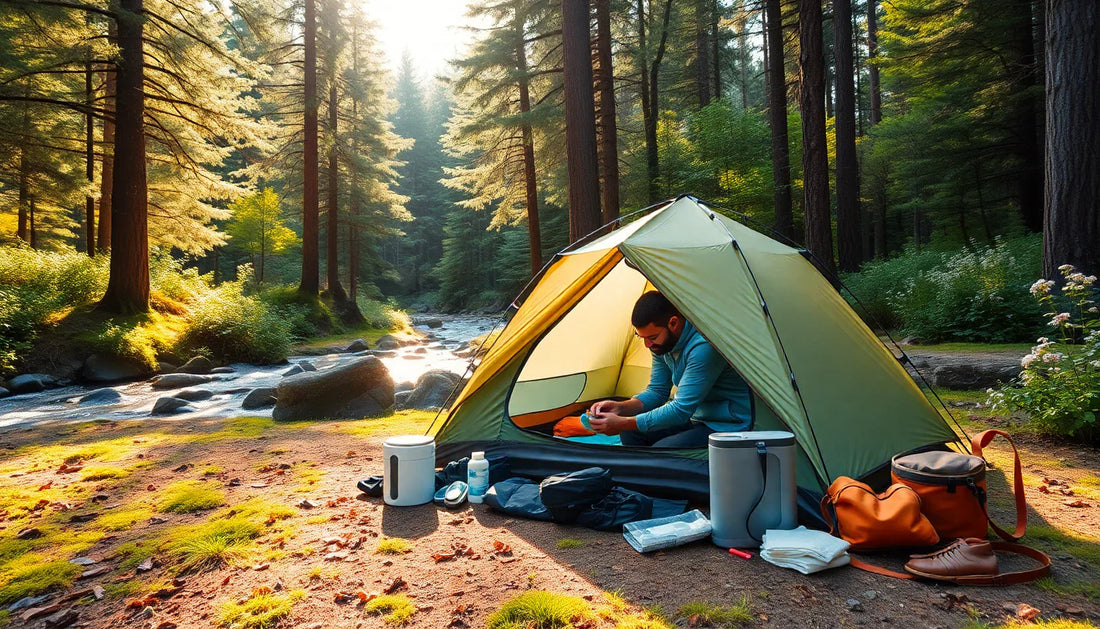
Camping with Allergies: Tips for Staying Safe Outdoors
Share
Embarking on a camping adventure can be an exhilarating and rejuvenating experience, but for those with allergies, it can also present unique challenges. Whether you're dealing with seasonal sniffles, food sensitivities, or a heightened risk of insect-borne reactions, navigating the great outdoors requires careful planning and preparation. In this blog post, we'll explore a comprehensive guide to camping with allergies, equipping you with the knowledge and strategies to ensure a safe and enjoyable outdoor experience.
Pre-Camping Preparation
Before packing your gear and hitting the trail, it's essential to consult with your healthcare provider. They can help you assess your specific allergies, review your medication regimen, and provide guidance on managing your condition in the outdoor environment. With their input, you can create a personalized allergy management plan that addresses your unique needs.
In addition to medical consultation, it's crucial to assemble a comprehensive allergy kit. This should include any necessary medications, such as antihistamines, epinephrine auto-injectors, and inhalers. Don't forget to pack backup supplies and ensure they are within their expiration dates. Additionally, consider including items like saline solution, hypoallergenic skin creams, and a thermometer to help manage any allergy-related symptoms that may arise.
Allergen Prevention Strategies
Minimizing exposure to environmental allergens is a key component of a successful camping trip for those with sensitivities. Start by choosing a campsite that is well-ventilated and away from potential triggers, such as areas with high pollen counts or dense vegetation. When setting up your tent, opt for a model with a built-in air filtration system or consider using a portable air purifier to maintain a clean indoor environment.
Selecting hypoallergenic camping gear can also make a significant difference. Look for bedding, sleeping bags, and clothing made from natural, breathable fabrics that are less likely to trap and accumulate allergens. Avoid synthetic materials, which can exacerbate respiratory issues. Additionally, consider using a mattress topper or liner to create a barrier between you and potential allergens in the campsite.
Food Allergy Considerations
Navigating food allergies while camping can be a daunting task, but with proper planning, it can be managed effectively. Begin by carefully researching and packing your own allergy-friendly meals and snacks. Avoid relying on unfamiliar food sources, as cross-contamination can be a significant concern in the outdoor setting. Ensure that your food is stored in airtight containers and kept at the appropriate temperature to prevent spoilage and potential allergic reactions.
When dining, be vigilant about ingredient lists and food preparation methods. Communicate your dietary needs clearly to any fellow campers or outdoor guides, and consider bringing your own cooking utensils to minimize the risk of cross-contamination. If you're planning to forage or hunt for your own food, it's crucial to have a thorough understanding of which plants and animals are safe for your specific allergies.
Respiratory Allergy Management
Dealing with seasonal allergies or asthma can present unique challenges in the great outdoors. To manage respiratory sensitivities, pack a supply of your prescribed medications, such as antihistamines or inhalers, and ensure they are easily accessible. Consider wearing a protective face mask or bandana when engaging in activities that may stir up pollen or dust.
If you're planning to participate in more strenuous outdoor activities, such as hiking or kayaking, be mindful of your respiratory capacity and take breaks as needed. Engage in breathing exercises and techniques to help manage any allergy-induced symptoms, and be prepared to modify your itinerary if your condition becomes unmanageable.
Insect and Skin Allergy Protection
Insect bites and stings can be a significant concern for those with allergies, as they can trigger severe reactions. To minimize the risk, pack a supply of insect repellent and wear long, loose-fitting clothing that covers exposed skin. Inspect your campsite for any potential nesting areas and take steps to eliminate them, if possible.
In the event of an allergic reaction to an insect bite or sting, be prepared to respond quickly. Ensure that your emergency medication, such as epinephrine auto-injectors, are easily accessible and that you know how to administer them properly. Additionally, consider packing antihistamine creams or gels to help soothe any localized skin irritation.
Conclusion
Camping with allergies may require a bit more planning and preparation, but it's certainly not an impossible feat. By arming yourself with the right knowledge, tools, and strategies, you can confidently embrace the great outdoors and enjoy all the benefits that nature has to offer. Remember, your health and safety should always be the top priority, so don't hesitate to modify your plans or seek medical attention if necessary.
With the right approach, you can embark on your camping adventures with a sense of empowerment and the confidence to manage your allergies effectively. So pack your gear, take a deep breath of fresh air, and get ready to create unforgettable memories in the great outdoors.
